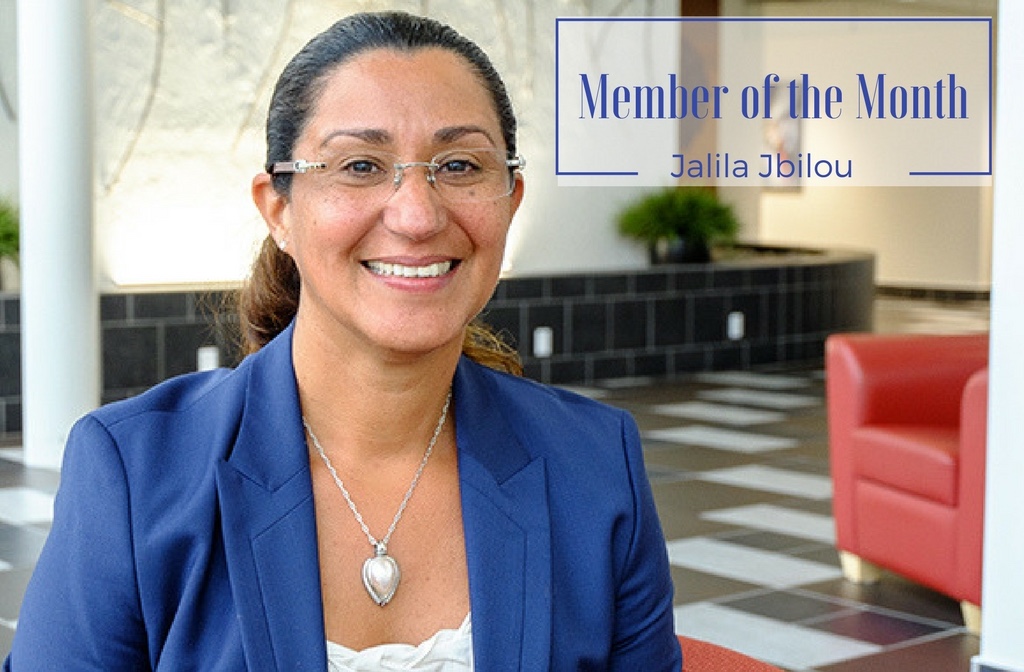Jalila Jbilou
 1) What is your official current position and title?
1) What is your official current position and title?
Jalila Jbilou, MD, MSc, Ph.D.
Associate Professor, School of Psychology, Université de Moncton
Instructor-researcher, Centre de formation médicale du Nouveau-Brunswick
Adjunct Professor, Community Health, Université de Sherbrooke
Adjunct Professor, Community Health, Université Laval
2) What is your educational background?
Doctorate in community health (Ph.D.), Université Laval, Québec, QC, Canada
Specialist certificate in public health, Moroccan Order of Physicians, Rabat, Morocco
Master of Science (MSc), Université Laval, Québec, QC, Canada
Doctor of Medicine (MD), Fattouma Bourguiba Faculty of Medicine, Monastir, Tunisia
3) Talk a little about your career path? Where did your passion for the work that you do originate and how did it develop?
My medical education, specifically, in public health, and my community health research career have helped me to understand community health issues related to the concept of gender and intergender relations. All my projects have been based on an inclusive approach (the involvement of decision-makers, managers, professionals and service recipients) and focused on action (intervention projects). My commitment to research only makes sense for me if I can anticipate and validate concrete actions. The changes required to improve the health of populations, specifically, those living with daily challenges, are at the political and organizational levels as much as the societal. To translate the French saying, “health doesn’t have a price, but it does have a cost,” but that cost can be optimized through a collective movement in which I’d like to play a role. This type of research takes a great deal of time to demonstrate its effects, but that’s the challenge that gets me out of bed every morning.
4) Tell us about one or two of your current projects?
PairForm
PairForm is a community project developed in collaboration with the Lamèque Hospital and Community Health Centre that is currently being delivered in the context of routine services. Its central vision is the creation of a functional interface between health services and the community to support positive health practices. It’s an intervention founded on the development of local disease prevention capacities and support for healthy behaviour. Its originality lies in the fact that community members deliver it in locations convenient for them at their own pace while having the opportunity to attend health education sessions led by health professionals.
Mind the Heart/Le Cœur à l’esprit
Mind the Heart/Le Cœur à l’esprit is one of the largest projects to receive New Brunswick research funding. The Movember Foundation Canada and the New Brunswick Health Research Foundation awarded $3.45 million to [my team and me] to implement a project focusing on the prevention, early identification and treatment of mental health issues among men with heart disease. This participatory/action-based research project has been implemented in three Canadian provinces (New Brunswick, Quebec and Ontario) and includes three components: research, awareness/training and intervention.
The project deals with:
1) The development of awareness-raising campaigns to increase knowledge and understanding of the connection between heart disease and mental health issues in men;
2) The training of professionals on the early detection of mood, anxiety and post-traumatic stress disorders and their associated risks in men living with or at risk of heart disease;
3) Monitoring 3,000 male Canadian patients living with heart disease in the three provinces to establish an educational program on mental health and a stepped care model for mood, anxiety and post-traumatic stress disorders in men living with heart disease;
4) The development of technological tools such as a website and mobile application to support education, prevention, early detection and treatment for mental health issues among men living with or at risk of heart disease.
5) How do you see your work in terms of possibly contributing to evidence-based public policy?
My projects are intended to develop contextualized knowledge and evidence while facilitating implementation and continuity in the environments where I work. With regard to the development of public policy, although my research does not directly concern that aspect, one of the major impacts I see is integrating a concern about gender in all social and health policy, the idea being to correct the intergender imbalance and adapt approaches based on the needs and realities of each. In this context, that also includes all the needs of LGBTQ communities. Furthermore, my projects could have an impact on the development of healthy public policy by making sure that not only gender is considered but also mental health.
6) Discuss any past achievements that were significant to your professional path? Have any contributed to the promotion of evidence-based public policy?
My projects are in the realms of service organization, changing professional practices and community awareness. I’ve been conducting research for six years, and that time is still not enough to predict an impact on public policy.
7) Describe in a couple of sentences your involvement with NBSPRN and how your relationship with the Network has contributed to your research/work and/or to social/economic policy?
I’ve received major support from the NBSPRN various times during the organization of my meetings and workshops on men’s health. I’ve also participated with my team at GovMaker, which is a sizeable forum for networking but also for presenting local innovations and sharing experiences. I’ve used the NBSPRN interface to identify collaborators and start research projects. The NBSPRN is currently an essential hub for narrowing the gap between research and action and improving the use of evidence to inform public policy and practice in all areas. Bravo!




